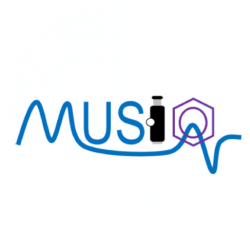Simulating ultrafast coherent phenomena in model light-harvesting complexes
Position Filled
Supervisors: Prof. Elisa Molinari, Dr. Filippo Troiani
Università di Modena e Reggio Emilia
Early Stage Researcher within the collaborative research project MUSIQ in the frame of the EU Horizon2020 Marie Skłodowska-Curie Actions Innovative Training Networks H2020-MSCA-ITN-2018.
- Starting date: November 01 2019
- Duration: 36 months
- Full time (40 hours/week)
- Salary: Gross salary about 3000 € per month plus 600 € monthly relocation allowance and 500 € monthly family allowance (if applicable).
- Closing day for receiving applications: 20/06/2019 (at 1.00 p.m., local time)
- Please apply to the job via the local advert: https://www.unimore.it/AZdoc/CallPhDEnglishXXXVINTERNET.pdf
Job Description
The successful candidates will be expected to conduct research under the guidance of Prof. Elisa Molinari and Dr. Filippo Troiani with the aim of obtaining a PhD in Physics.
Objectives: To develop a microscopic understanding of the ultrafast charge separation process in model light-harvesting systems representative of selected experimental samples. Building from the strong expertise of Molinari’s group, this project will start from the ab-initio description of relevant exciton and vibrational states for prototypical light-harvesting molecular/polymer systems.
Simulations based on density functional (DFT) and many-body perturbation theory (MBPT) will provide the relevant spectra for characterizing the systems. We will address variable intermolecular alignments and distances mimicking experimental samples. The analysis will focus on the relation between the atomic-scale structure and the energy and nature of the excited states of relevance for photo-induced charge transfer. Data from the experimental groups in MUSIQ, especially 2DES from POLIMI for controlled polymer and blend samples, will provide experimental validation of different ingredients. This overall approach will allow us to establish a relation between the microscopic arrangement of prototypical organic structures and quantum coherences observed by 2DES, opening the way to a more rational design of artificial materials for photovoltaic applications. In the last part of the project, we will explore the use of entanglement measures as a unifying quantitative characterization scheme for spatial coherence in the system eigenstates, as well as degree of coherence in the system dynamics (through the off-diagonal elements of the density matrix in the excitonic manifold). Entanglement will also be used to quantify the mixing between electronic and vibrational degrees of freedom in the system eigenstates (static vibronic coherences), especially in systems where such mixing is suspected to significantly contribute to the creation and preservation of the observed dynamical coherences.
The research activity is performed within the framework of MUSIQ, an innovative ETN with the unique vision of developing the next-generation optical microscopy exploiting quantum coherent nonlinear phenomena. Through 15 ESR research projects, MUSIQ will establish an intersectoral training and research programme at the physics/chemistry/life science interface with partners from 9 European countries. MUSIQ ESRs will enroll on PhD degree programmes and be employed for 36 months in a beneficiary organisation. The consortium brings together a unique team of world-leading academic groups and industry, at the forefront of optical microscopy technology developments merged with fundamental understanding of ultrafast coherent light-matter interaction phenomena, development of quantitative image analysis tools, and biomedical/pharmaceutical real-world applications. MUSIQ aims at creating the next generation of skilled well-connected scientists that will pioneer the ‘quantum microscopes of tomorrow’.
The University of Modena and Reggio Emilia has a Department of Physics, Informatics and Mathematics with a leading research group in computational nanoscience. It hosts an interdisciplinary PhD Curriculum in Physics and Nanosciences, strongly oriented to Ab-initio Computational Methods for Materials and Nanoscience. It also hosts and closely collaborates with the Istituto Nanoscienze of the Italian National Research Council (CNR-Nano), which is devoted to frontier research in nanoscience and nanotechnology.
Other: Specific to MUSIQ, in addition to their individual scientific projects, all ESRs will benefit from further continuing education through a dedicated training program in the various fields of expertise of the consortium partners, which includes secondments, a variety of training modules, transferable skills courses and active participation in workshops, conferences and outreach activities.
Planned secondment(s): SVI (van der Voort), 1month, to be trained on state-of-the-art image analysis; APE (von Volkmann), 1 month, to be trained on their ultrafast laser sources; POLIMI (Maiuri and Cerullo), 2 months, for direct collaboration with the experimental team at POLIMI. ICFO (van Hulst), 2 month, for direct collaboration with the experimental team at ICFO.
As part of the position, the successful candidate will be enrolled as a student for a PhD at the Università of Modena and Reggio Emilia. For any additional information, please contact Prof. Elisa Molinari ([email protected]) or Filippo Troiani ([email protected]).
Conditions of eligibility of researchers
Essential Criteria
- Master’s Degree (or equivalent) in physics or related disciplines. The degree must be obtained before 20/06/2019.
- Good command of written and spoken English (certification required)
- Expertise in atomic, molecular, and/or solid state physics, and optics.
- Knowledge of research methods and techniques within specialist field.
- Proven ability to analyse complex information and summaries appropriately.
- Proven communication skills, including presentation to various audiences.
- Excellent organisational and team-working skills.
- Proven ability to demonstrate creativity, innovation and accuracy within work.
- Experience in theoretical and/or computational Physics is preferential.
Documents
- Letter of motivation, explaining the reasons for applying to Modena
- Full CV
- Transcript of academic records and copies of diploma
- Names of at least two references who are willing to write a letter of recommendation on the candidate’s behalf (they may be contacted by us)
- Any other relevant documents
Additional requirements
Must at the date of recruitment, be in the first four years (full-time equivalent research experience) of their research careers and have not been awarded a doctoral degree. ‘Date of Recruitment’ means the first day of the employment of the researcher (i.e. contract starting date). ‘Full-Time Equivalent Research Experience’ is measured from the date when the researcher obtained the degree entitling him/her to embark on a doctoral degree programme.
Must not have resided or carried out their main activity (work, studies, etc.) in Italy for more than 12 months in the 3 years immediately before the recruitment date. Compulsory national service, short stays such as holidays, and time spent as part of a procedure for obtaining refugee status under the Geneva Convention are not taken into account.
Further Information
The applications will be reviewed as soon as received. The call will be open until 20 June 2019.
Important
As well as applying to the Università di Modena e Reggio Emilia, please send your CV with a Cover Letter to the Consortium Coordinator email: [email protected]. In the Cover Letter please indicate for which project you are applying and provide a brief motivation as to why you wish to become an ESR within MUSIQ. Please be aware that your CV may be shared with the named beneficiaries within the consortium, as part of the application review process, to ensure an open, transparent and merit based recruitment. Please see the full MUSIQ Data Privacy Notice.

